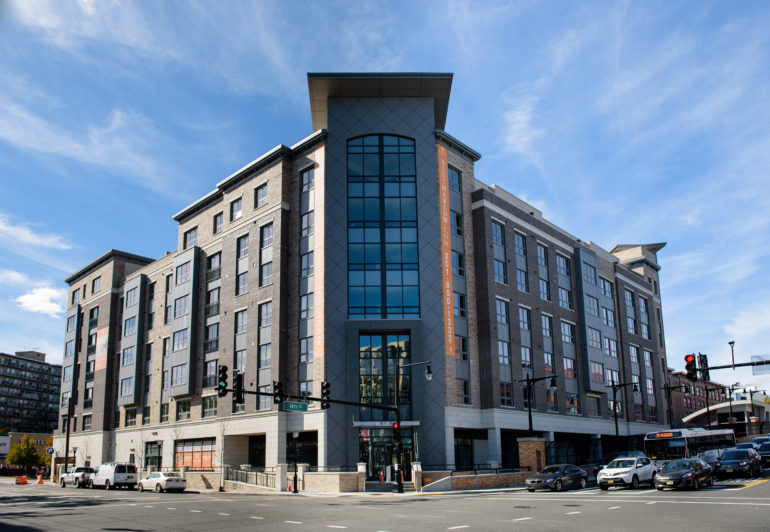Harlow, Advance Realty’s new 140-unit luxury apartment building in Hoboken, sits at the corner of 14th Street and Willow Avenue. — Photo by Jeffrey Vock for Real Estate NJ
By Joshua Burd
For Advance Realty and the city of Hoboken, the new mixed-use, seven-story building at the corner of 14th Street and Willow Avenue is an obvious symbol of triumph. With its upscale amenities and 140 new luxury apartments, the project is already luring well-to-do renters to a neighborhood that has trailed behind the city’s famously gentrified waterfront.
What’s not so obvious is the engineering feat that allowed Advance to build the property — while laying the groundwork to attract one of the city’s most highly anticipated retailers.
Known as Harlow, the new rental building occupies a site whose soil had been left polluted by decades of former commercial uses. Advance’s task of removing that soil began in 2011, but was complicated by the depth of the contamination — more than 50 feet in some places — and by the realization that a conventional excavation would not work in the property’s tight urban footprint.
The challenge required a solution — one that came with a previously unforeseen opportunity.
The developer’s team of contractors and engineers devised a plan that they would implement over the next four years, first by installing a cement, bathtub-like wall around the perimeter of the one-acre site and then carrying out the excavation. In the process, Advance used the extra depth to expand Harlow’s below-grade parking capacity from one level to four, building each level from the top down as crews slowly mined the soil to the bedrock below.
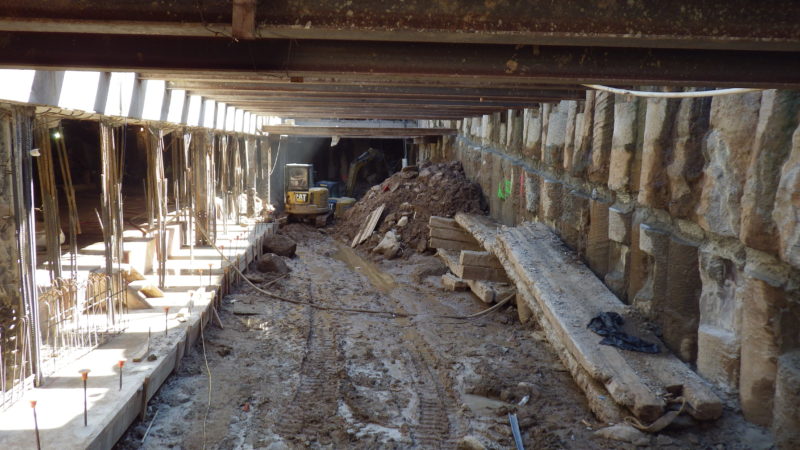
The addition of more than 200 spaces proved to be critical in luring the upscale grocery store Trader Joe’s to the property — creating a buzz for the site that would be tough to replicate.
“Advance took advantage of the fact that we had to dig that out and turned it into an economic upside,” said Chip D’Angelo, president of the environmental consulting firm WCD Group. “A lot of people don’t do that — they deal with them separately — so our message is: If you can tell us, as a cleanup engineer and manager, what you’re building, we can then better design and implement a cleanup to integrate with your new construction.
“This is the epitome of that.”
Trader Joe’s is now set to open its 17,400-square-foot store this spring, much to the delight of thousands of Hudson County residents. But executives with Advance, who are undoubtedly thrilled to have the anchor tenant, are more focused on the bigger picture: Hoboken’s northern and western neighborhoods may in fact be the city’s next frontier.
“This is truly bringing a lot more energy to the local community,” said Kurt Padavano, Advance’s chief operating officer. “Every time you build a project, you create more density and then the restaurants do better and the day schools do better. We’re pretty early on in the development of this end of town, and this kind of project is very meaningful.”
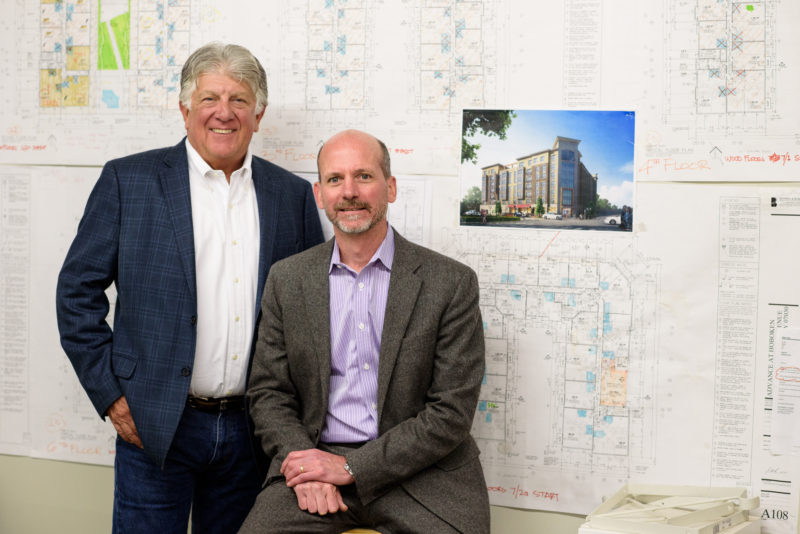
Leaders of the Bridgewater-based firm touted that promise at a ribbon-cutting ceremony in late November. By that time, Harlow had already leased nearly a quarter of its 140 units, luring renters with its amenities, high-end finishes and a wealth of nearby transportation options.
Padavano believes Advance has checked every box when it comes to services and common spaces, with everything from a package room and 24-hour concierge to an outdoor pool and landscaped deck. Not to mention that Trader Joe’s will be an offering that is truly unique for the area, giving renters both the ultimate convenience and a desirable option.
What tenants may not appreciate is that Harlow is now one of the cleanest properties in all of New Jersey, according to Padavano and D’Angelo. And it represents a success story in both urban renewal and environmental remediation.
“It was a fenced-in, troubled, dirty trash lot,” said D’Angelo, whose Pennington-based firm has worked on at least a dozen projects with Advance. “It was truly an eyesore and a contaminated piece of property that nobody wanted.
“People have an inert objection and fear of a contaminated site, but if you know how to handle it and deal with it, you can turn it into an asset.”
Environmental concerns at the site date back to the late 1800s, when it housed a manufacturing plant that made gas for street lamps, D’Angelo said. Decades later, the property became a gas station and convenience store that operated through the mid-1990s.
It had been converted to a simple surface lot when Advance acquired it from Cumberland Farms, but beneath that surface was about 65,000 cubic yards of contaminated earth. Under the terms of sale, which closed in early 2011, the developer assumed the obligation for the cleanup and would take the lead in removing the dirty soil.
So began the process of trying to dig an unusually deep hole in a roughly 40,000-square-foot box. In a typical excavation, D’Angelo said crews will build temporary support walls and anchor them to the adjacent property, preventing the sides of the digging area from caving in. But that was impossible in this case, due to the site’s location next to the 14th Street viaduct and the surrounding utility infrastructure.
Instead, Advance’s team of contractors and engineers, led by Posillico Environmental Inc., turned to a concept known as a secant wall. The process involves drilling a series of overlapping holes around the property line and filling each with concrete, creating interlocking pilings that would support the excavation and keep out groundwater out as the digging takes place.
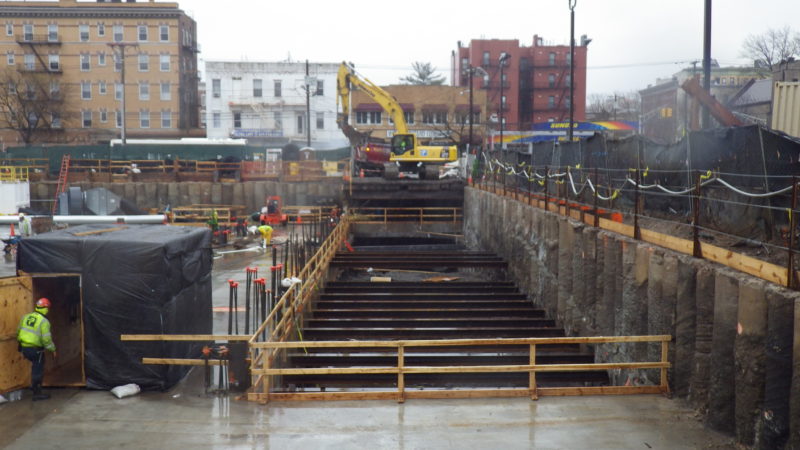
All told, crews drilled and poured nearly 300 secants with the soil still in place, D’Angelo said. The columns descended some 50 feet below the surface, including a five-foot “socket” into the underlying bedrock to create additional support for what would become Harlow.
When it came time to excavate, the team took another unconventional approach by digging and pouring the parking garage floor one level at a time. Each time, the crews left a hole in the floor large enough to allow Bobcat vehicles and other small equipment to slowly mine the next level.
“Most people think of construction as: You start at the bottom and you build something going up,” Padavano said. “We started at the ground level and we built going down.
“It’s the equivalent of digging the foundation with a spoon.”
RELATED: For developer, excavation brought challenges upon challenges
By mid-2015, the contracting team had removed the dirty soil and disposed of it off-site. Advance was left with four levels of underground parking by the time the firm announced it was starting vertical construction, doing so with no mention of the massive excavation project that had just taken place.
But the landlord was well aware of the benefits it had gained as a result of the big dig — and not just because of its lease to Trader Joe’s. The building still has excess parking beyond the required one to 1.2 spaces per unit, and Advance is now exploring other ways to take advantage.
“Everybody knows Hoboken is challenged in the parking area, so obviously it helped get approvals at the town level to know that this building had sufficient parking for itself, but it helped us with the retailer to know that they had a level of parking that’s dedicated just to them,” Padavano said. “There’s also additional revenue components that we can generate from daily parkers, monthly parkers, hourly parkers that maybe live in buildings around here that don’t have sufficient parking.”
Advance has acquired two nearby sites in Hoboken’s north end. And while executives said it was too early to discuss their plans, the firm has multifamily and mixed use in mind as the neighborhood continues to develop.
At this point, it’s very likely they won’t face the same engineering challenges. But the firm will certainly be prepared for anything that comes its way.
“We didn’t get into this business wanting to be in the environmental cleanup business, but if you’re developing in New Jersey, you just gain that experience and expertise over time,” Padavano said. “And now we’re very comfortable understanding what the costs are, what the challenges are, what the regulatory environment is, the construction, so we’re comfortable over it at this point.”
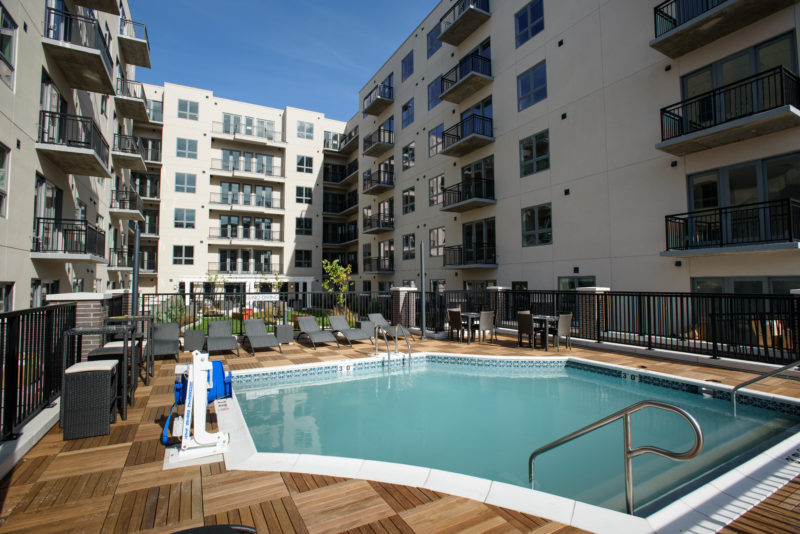
Economic sense
There’s no doubting that the environmental cleanup like the one done at Harlow is a considerable expense. But don’t expect those costs to translate into above-market rents at the building.
“Market rent is the market rent, so whether you had challenges or extra costs, it’s your issue,” Padavano said. “For us, we bought the site at what we considered to be a discount to what market value would have been, but that was because of the environmental challenges.”
Padavano declined to discuss specifics, but noted that some of the environmental cleanup costs were borne by the site’s previous owner. All that translated into a project that still makes economic sense for Advance — while still allowing it to offer competitive lease terms.
“All in all, our economics are probably not much different at the end of the day than everyone else’s economics. But we’ve got a project here that is, I would say, better than what most people would build.”
(Editor’s note: This story has been updated to reflect the new projected opening date of Trader Joe’s.)

